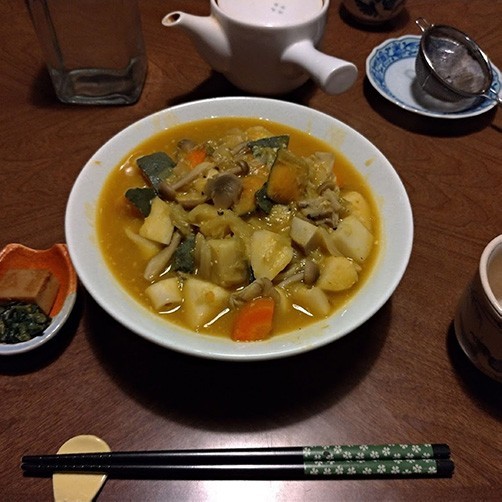Winter is the most yin season of Chinese energy. To give the body the strength to fight the cold, it is important to eat yang food. But what to eat in winter then? In this article, I will share with you the main things to add to your diet in winter food.
WINTER FOOD TO STAY HEALTHY : THE SECRETS OF CHINESE MEDICINE
Flavour of my winter food
Cook salty, to strengthen the energy of the kidneys and bladder. Eat hot, cooked and lightly spicy food. This will help the body fight the cold and feel less tired. Not too spicy either! Otherwise you will sweat too much and lose water. And this will require too much energy from the kidneys for regulation.
Eating local and organic
In addition, give your body locally produced and organic food. Because nature is well done. Because the earth you live in provides you with exactly the nutrients you need. As long as you respect your environment, of course!
And if you live in Japan like me, unfortunately we have the Fukushima parameter to take into account… Flavour foods from Yamanashi, Nagano, Hokkaido and Kyushu in general. Avoid all food coming from the east coast of Fukushima south of Tokyo… including Chiba.
Eat early and go to bed hungry in winter.
Therefore, it is strongly advised to eat earlier, in order to go to bed after the end of digestion.
In winter, I go to bed on an empty stomach and with a light heart.
Proverbe Chinois
Whet to order bio / organic vegetables in Tokyo?
You can order from my friends, natural agriculture and organic vegetables in early winter only. Then, it’s true that it’s more complicated to find apart from Daikon and Hakkusai!
YUI TAKASHI: You can buy our vegetables at Fukushima-ya in Akishima, Roppongi and Tachikawa (no shipping).
TARO TOMISAWA, from Yamahata Farm (closed from February to April, sending to Tokyo possible)
WINTER FOOD: WHAT TO EAT?
1. Fresh and dried fruit
It is recommended not to eat raw fruit that cools the body. Once again, nature gives us what we need when we need it. At the beginning of winter we have the season of chestnuts and pears. You can add walnuts, almonds, pine nuts, pistachios, hazelnuts.
2. Sea fruits
To nourish the yin of the kidneys, don’t hesitate to integrate seafood. For example, fish, seafood, shrimps. Indeed, these foods are enriched with vitamins, mineral salt, trace elements and proteins.
3. Seasonal fruit and vegetables, produced in your region
Nature is well done. The earth we live on gives us exactly what we need in terms of nutrition and energy. For example, at the beginning of winter we have yellow vegetables like squash. Then we have root vegetables like beets, carrots, Jerusalem artichokes, turnips, daikon). And finally cabbages called Hakusai in Japan. For those who tolerate the taste, it is advisable to make broths simmered with bones.
4. Animal proteins
Chicken, duck and egg yolk warm the kidneys. I remind you that you should not force yourself to be a vegetarian. Or even adopt a diet that is not adapted to your body. However, be logical and resonate in your actions in order to consume with a clear conscience. Indeed, it is best to inform yourself about the origin of the foods you choose.
The influence of the environment on living things
Animals, plants and vegetation, just like humans, are sensitive to environmental parameters. This is true whether in terms of external toxicity (pollution, chemical treatments), spatial conditions and planning (geo-biology and feng shui) or internal state (emotional, stress).
What you eat during your lifetime, nothing escapes these rules. What you ingest does not have the same nutritional and energetic power according to your space and living conditions. Thus, without even mentioning ethics and respect for living things, a hen’s egg living in space and fed with unprocessed food would certainly not have the same nutritional and energetic properties.
As far as quantity is concerned, be moderate for meat in particular. It is best to end a meal with a stomach that is not completely full.
5. Cereals and legumes to add in your winter food
Eat hot cereal porridge every day. For example, lentils, millet, split peas, soy, quinoa, rice. You can also eat soba (buckwheat paste) and oat porridge which warms the kidneys and is gluten-free.
6. Mushroom
In Japan, at the beginning of the winter, before the great cold, shitake and maitake are harvested. They are also excellent for the body and are considered to have medicinal properties.
7. Medicinal herbal teas to improve your health in winter
In winter we often don’t think enough about drinking water. Outside, the air is drier. Even more so with the heaters, which tend to dehydrate. Although the ideal is to drink water alone (lukewarm) to hydrate as often as possible, we should give preference to all dishes containing a lot of water.
For herbal teas, prefer spicy blends: ginseng, liquorice, rehmannia, or Chinese digitale reishi … Or the chai for example, with cinnamon, pepper, ginger and cloves. You can try my recipe for throat tea.

